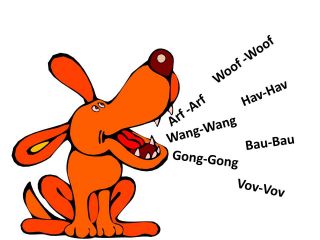How Dogs Bark in Different Languages

Almost all dogs bark. Science has shown that virtually all dogs also can understand the barks of other dogs regardless of where they come from, however the way that humans hear those barks differs depending upon the language that people speak and the culture that they live in. We humans often try to communicate the sounds of dogs barking to other humans when we are telling stories using common words like "woof-woof" in English. We also write these word sounds down, particularly in things like comic strips where a dog might be saying "arf-arf" or in children's books where we might indicate that a dog is barking using "bow-wow."
Linguists would tell you that the words that we use to represent dog barks are based upon onomatopoeia, which is the process by which we try to characterize a real world sound with a word that sounds something like it. Some common examples of onomatopoeia are hiss, buzz and thud.
I suppose that when I posted my list of the words used to say "dog" in some 250 different languages [click here to see that list], it was inevitable that people would start to write to me to ask if dogs spoke different languages. Many of the queries were obviously concerned with how people hear or interpret the sounds of dogs barking as when they asked questions like, "Is the word 'woof' used for dog barks in all other languages?"
The answer is that there is no universally accepted sound that humans use to represent dog barks. Even in a single language there may be a number of different words used for a dog's bark, for example, in English we recognize "woof-woof," "arf-arf", "ruff-ruff" and "bow-wow." Many languages also have different words for the barks of large versus small dogs, thus "yip-yip" or "yap-yap" are used in English for the barking sounds of small dogs, never for big dogs. The only thing that seems to come close to being unanimously agreed upon about dog barks is that dogs almost always speak twice—thus a Hebrew dog says "hav-hav", a Japanese dog says "wan-wan" and a Kurdish dog says "hau-hau".
Over the years I have collected over 100 dog bark words from more than 60 different languages. So to answer the question of how dogs bark in different languages (at least as far as their human listeners are concerned) I have decided to give you a look at my collection. The list is alphabetical by language, and is presented in the format "Language → Word(s) Used For Dog Barks", where the word for a dog's barking sound is spelled out phonetically, or at least phonetically as I hear the word when it is spoken (except for American Sign Language or ASL which obviously has no phonetic equivalent).
Language → Word(s) Used For Dog Barks
Afrikaans → blaf-blaf woef-woef keff-keff (small dogs)
Albanian → ham-ham
American Sign Language (ASL) → Both closed fists held horizontally together-fingers in towards each other. Quickly open the fists together to expose the fingers twice.
Arabic → hau-hau how-how
Armenian → haf-haf
Balinese → kong-kong
Basque → au-au (any dog) txau-txau (small dogs) zaunk-zaunk (large dogs) jau-jau (old dogs)
Belgian → wooah-wooah (if you believe Tintin's dog Snowy is typical)
Bengali → gheu-gheu bhao-bhao
Bulgarian → bau-bau jaff-jaff
Burmese → woke-woke
Catalan → bau-bau bub-bub
Chinese-Cantonese → wo-wo wow-wow wong-wong
Chinese-Mandarin → wang-wang
Croatian → vau-vau
Czech → haff-haff
Danish → vov-vov vuf-vuf
Dutch → blaf-blaf woef-woef waf-waf (small dogs) kef-kef (very small dogs)
English → woof-woof ruff-ruff arf-arf bow-wow yap-yap (small dogs) yip-yip (very small dogs
Esperanto → boj-boj
Estonian → auh-auh auch-auch
Finnish →hau-hau vuh-vuh rauf-rauf
French →wouaff-wouaff ouah-ouah whou-whou vaf-vaf jappe-jappe (small dog)
German → wuff-wuff vow-vow
Greek → ghav-ghav
Hebrew → hav-hav haw-haw-how-how
Hindi → bow-bow
Hungarian → vow-vow, vau-vau
Icelandic → voff-voff
Indonesian → guk-guk gong-gong
Irish → amh-amh
Italian → bau-bau arf-arf
Japanese → wan-wan kian-kian
Korean → mung-mung wang-wang
Kurdish → hau-hau
Latvian →vau-vau
Lebanese → haw-haw
Lithuanian → au-au
Macedonian → av-av
Malay → gong-gong
Marathi → bhu-bhu bho-bho
Nigerian (Calabar area) → wai-wai
Norwegian → voff-voff boff-boff vov-vov
Persian → vogh-vogh cut-cut bad-bad
Polish → hau-hau
Portuguese → au-au
Romanian → ham-ham hau-hau
Russian → gav-gav guf-guf hav-hav tyav-tyav (small dogs)
Serbian → av-av
Sinhala → buh-buh
Slovak → haf-haf hau-hau
Slovene → hov-hov
Spanish → guau-guau gua-gua jau-jau
Swedish → voff-voff vov-vov
Tagalog → ow-ow baw-baw
Tamil →wal-wal, bow-bow, lol-lol
Thai → hong-hong
Turkish → hev-hev hav-hav
Ukrainian → hau-hau haf-haf dzyau-dzyau
Urdu → bow bow
Vietnamese → gau-gau wau-wau ang-ang
Welsh → wff-wff
Article source: https://www.psychologytoday.com/blog/canine-corner/201211/how-do-you-say-dog
Image source: https://cdn.psychologytoday.com/sites/default/files/styles/article-inline-half/public/blogs/1987/2012/11/111018-108878.jpg?itok=Z0yJVttD
VOCABULARY WORDS:
1. Virtually (adv) - for the most part almost wholly just about
2. Indicate (v.) - to point out or point to direct attention to
3. Linguist (n.) - a specialist in linguistics
- a person who is skilled in several languages polyglot
4. Onomatopoeia (n.) – the formation of a word as cuckoo, meow, honk, or boom, by imitation of a sound made by or associated with its referent.
QUESTIONS FOR DISCUSSION:
1. How do dogs bark in your country?
2. In your country, do small dogs bark differently than big dogs?
3. What sounds do frogs/goats /cats /etc. make in your country?
4. Do you have onomatopoeic words in your language? Give examples. What do they mean?